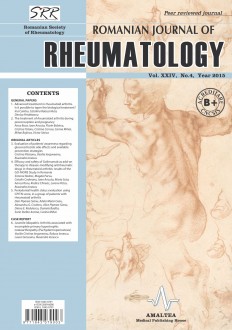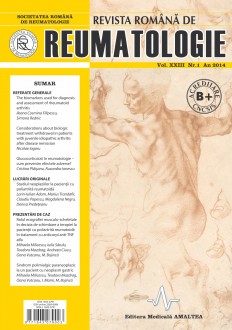SELECT ISSUE

Indexed

| |

|
|
|
| |
|
|
|

|
|
|
|
|
|
| |
|
|
HIGHLIGHTS
National Awards “Science and Research”
NEW! RJR has announced the annually National Award for "Science and Research" for the best scientific articles published throughout the year in the official journal.
Read the Recommendations for the Conduct, Reporting, Editing, and Publication of Scholarly work in Medical Journals.
The published medical research literature is a global public good. Medical journal editors have a social responsibility to promote global health by publishing, whenever possible, research that furthers health worldwide.
EVALUATION OF PATIENTS’ AWARENESS REGARDING GLUCOCORTICOIDS SIDE EFFECTS AND AVAILABLE PREVENTION STRATEGIES
Cristina Plăişanu, Vasilia Cristina Iorgoveanu and Ruxandra Ionescu
ABSTRACT
Glucocorticoids are drugs used in various medical areas, but well known for the myriad of side effects which are still a concern for the medical world. Latest recommendations on this matter aim at improving their management and implementing adequate prevention strategies. This aspect would change patient’s perspective on this treatment, reducing the fear and uncertainty associated with glucocorticoids.
Objective. Our study focuses on analysing the level of information that patients hold about glucocorticoids side effects and if the available prevention strategies are known and applied in clinical practice.
Material and methods. Study included 85 patients with rheumatic pathology and glucocorticoid therapy for at least 3 months. Study design was prospective observational and consecutive hospitalized patients were recruited, receiving and compiling a specific questionnaire.
Results. 85 patients (84.7% women, mean age 54.42 ± 16.54 years) mostly under corticotherapy due to rheumatoid arthritis (44.7%) and systemic lupus erythematosus (23.5%) were recruited. Patients with higher education had the tendency to discontinue treatment (r=0.289, p=0.007). Moreover, reading prospectus has a great influence on treatment compliance (treatment risks significantly correlated with disease duration and glucocorticoid therapy duration (r=0.232; p < 0.032, r=0.252; p <0.024 respectively). Awareness about the risk of osteoporosis correlates with reading the prospectus (r= 0.396; p <0.0001), glucocorticoid treatment duration (r=0.209; p <0.032) and the use of vitamin D supplements (r=0,315; p <0.003). Regarding glucocorticoid administration timetable, we identified two groups – early morning and late evening (44.7% vs. 55.3%), showing a non-uniform treatment schedule.
Conclusions. Our study shows an inadequate level of information regarding patient’s awareness on glucocorticoid treatment. Although excellent prevention strategies have been elaborated, there is a need of optimizing their accessibility to our patients.
Keywords: glucocorticoids, side effects, prevention strategies

